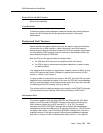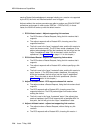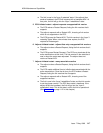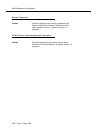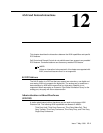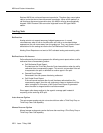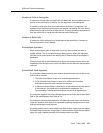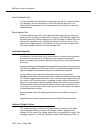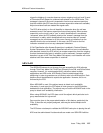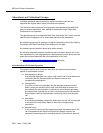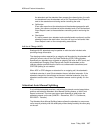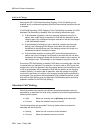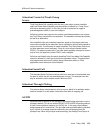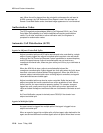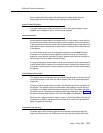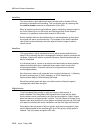
ASAI and Feature Interactions
Issue 7 May 1998
12-5
trigger the bridging of a service observer onto an outgoing trunk call, and 3) send
a Connected Event Report for outbound calls placed on non-ISDN trunks. This
message is ignored if the trunk is expected to receive true answer supervision
from the network (the ECS uses the true answer supervision whenever available).
Adjunct-monitored calls are treated like regular calls.
The ECS relies entirely on the call classifier to determine when the call was
answered, even if the answer supervision timeout had expired. When answer
supervision on the trunk is set to “yes,” a switch-classified call is considered
“answered” when the ECS software receives the “answer” message from the
trunk board. In reality, switch-classified calls may receive either an “answer”
message from the trunk board or (if this never comes) an indication from the
classifier that the far end answered. In this case, the ECS acts on the first
indication received but not on any subsequent indications.
If Call Classification after Answer Supervision is enabled in Feature-Related
System Parameters, then all switch-classified calls will not have a call classifier
port attached. Instead, the ECS will rely on answer supervision from the outgoing
trunk as the determining factor in whether a call is answered. If answer machine
detection is a part of the Third Party Make Call request, a call classifier will not be
attached until after answer supervision is received.
ARS/AAR
The ARS/AAR features do not change; they are accessible by ASAI adjuncts
through Third Party Make Call, Third Party (Domain) Auto Dial, and Route Select
requests. However, it is recommended that in situations where multiple
applications use ARS trunks, ARS Routing Plans be administered using
partitioning in order to guarantee use of certain trunks to the ASAI adjunct. Each
partition should be dedicated to a particular application. However, this is not
enforced by the ECS.
When ARS/AAR is used, if the adjunct wants to obtain trunk availability
information, it must query the ECS about all trunk groups in the ARS partition
dedicated for that application. The adjunct may not use the ARS/AAR code in the
query to obtain trunk availability information.
When using ARS/AAR, the ECS does not tell the adjunct which particular trunk
group was selected for a given call.
Care must be given to the proper administration of this feature, particularly the
FRLs. If these are not properly assigned, calls may be denied despite trunk
availability.
The ECS does not attempt to validate the ARS/AAR code prior to placing the call.
ARS must be administered if outbound calls are made over ISDN-PRI facilities.



